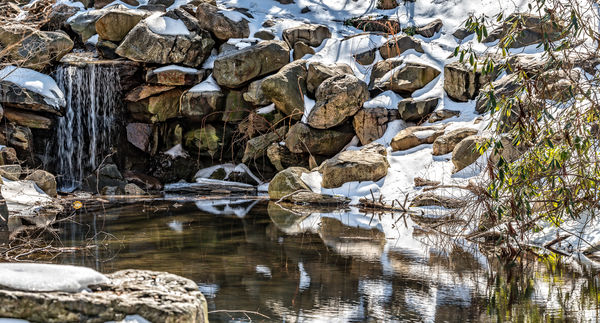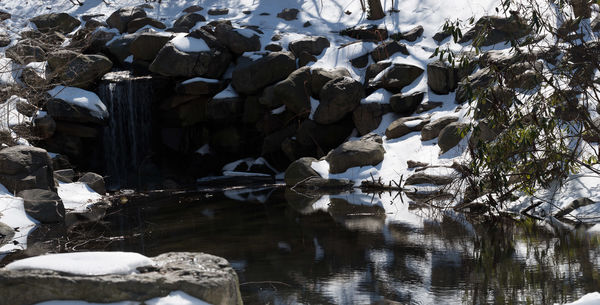PP or Graduated ND fillters
Mar 23, 2017 01:50:53 #
As an old newbie I'm seeking the wisdom of the collective. Whether to invest in a good & expensive set of graduated ND filters or try to learn to balance too bright skies and darker foregrounds with post processing tools. ALL thoughts & suggestions are appreciated.
Mar 23, 2017 02:03:01 #
I use both methods;
Usually ND grads for scenes with a relatively flat horizons (like dawn seascapes) and PPing for architecture etc (and that includes the use of subtle hdr processing).
Usually ND grads for scenes with a relatively flat horizons (like dawn seascapes) and PPing for architecture etc (and that includes the use of subtle hdr processing).
Mar 23, 2017 03:37:40 #
If you have the time to set a tripod, use exposure bracketing and then blend using luminosity masks, I think very good results can take place. However knocking down the sky by using a GND in one exposure under the right conditions can be convenient. So I would say, it depends.
Mar 23, 2017 03:56:20 #
For the times when you have a straight-line demarcation between dark and light elements in an image, the graduated ND is a great solution, and probably preferable to doing it in post processing. However, between the excellent dynamic range of today's cameras, and HDR technique, you can easil get equivalent results.
Besides, there are times when a GND is completely impractical, like when you are doing multiple row pano stitches, with uneven areas of light and dark.
I found myself at Prospect Park in Brooklyn several days ago, with only one lens - a Sigma 150-600 - not exactly a landscape lens. I came across a nice little waterfall that caught my eye, but I did not have a proper lens to capture the image in one take, and it was very high contrast - the waterfall was in deep shadow and the snow was brightly lit by the sun, and there was considerable back light. I did a pano stitch of three columns x 2 rows, hand held, with the camera set to 150 mm. I had to perform some heroics to get the detail out of the dark areas, but below you can see what I started out with and the result. This is not a great photo, and an ND32 to reduce my shutter speed from 1/50 to 1/2 sec would have been ideal to smooth the reflections in the water and the waterfall, and all of this mounted on a tripod, but the image is intended to show what is possible, not as an example of a great photo.
Besides, there are times when a GND is completely impractical, like when you are doing multiple row pano stitches, with uneven areas of light and dark.
I found myself at Prospect Park in Brooklyn several days ago, with only one lens - a Sigma 150-600 - not exactly a landscape lens. I came across a nice little waterfall that caught my eye, but I did not have a proper lens to capture the image in one take, and it was very high contrast - the waterfall was in deep shadow and the snow was brightly lit by the sun, and there was considerable back light. I did a pano stitch of three columns x 2 rows, hand held, with the camera set to 150 mm. I had to perform some heroics to get the detail out of the dark areas, but below you can see what I started out with and the result. This is not a great photo, and an ND32 to reduce my shutter speed from 1/50 to 1/2 sec would have been ideal to smooth the reflections in the water and the waterfall, and all of this mounted on a tripod, but the image is intended to show what is possible, not as an example of a great photo.
Mar 23, 2017 04:07:59 #
You should always try to capture the subject and get it right in-camera.
Treat yourself to a set of graduated filters.
Treat yourself to a set of graduated filters.
Mar 23, 2017 04:44:06 #
Mark1948 wrote:
As an old newbie I'm seeking the wisdom of the collective. Whether to invest in a good & expensive set of graduated ND filters or try to learn to balance too bright skies and darker foregrounds with post processing tools. ALL thoughts & suggestions are appreciated.
You only need one graduated ND filter and a bunch of step up rings. Put knowing how to achieve the same effect in PP is also important because sometimes what you see and shoot isn't what you wanted.
Mar 23, 2017 07:03:52 #
Right now in LR develop/ACR the graduated filter is the best choice especially since you can use the erase brush to remove the effect where it is not needed or wanted
Mar 24, 2017 07:52:47 #
A total no-brainer. PP. Layer masking in PS gives you infinitely variable transition shape and softness, completely independent control of all the parameters of the two different parts of the image. You don't have to buy or lug around or set up those costly and fragile filters, you suffer no image degradation. It is quicker, cheaper and gives you better quality in every sense. My grads see the light of day ONLY for shooting video.
Mar 24, 2017 07:58:04 #
Mark1948 wrote:
As an old newbie I'm seeking the wisdom of the collective. Whether to invest in a good & expensive set of graduated ND filters or try to learn to balance too bright skies and darker foregrounds with post processing tools. ALL thoughts & suggestions are appreciated.
As you said, they are expensive. I've never used them and don't see me getting any. If I have to balance the sky and the land, I use software. On the other hand, if you want them, and you'll use them, go for it!
Mar 24, 2017 08:01:52 #
Mark1948 wrote:
As an old newbie I'm seeking the wisdom of the collective. Whether to invest in a good & expensive set of graduated ND filters or try to learn to balance too bright skies and darker foregrounds with post processing tools. ALL thoughts & suggestions are appreciated.
I have an ND but not graduated. I feel I can do that in post in most cases. For a really a wide tonal range, consider HDR. Please note that HDR does not necessary mean, as seen in many cases, it has to come out a saturated mess. My opinion. The technique works well in cases like this, just post process with slow hand on saturation sliders.
Mar 24, 2017 08:08:22 #
Jeffcs
Loc: Myrtle Beach South Carolina
Regardless of method ND, Graduated ND, HDR best is getting it right in camera befor you hit PP you'll always end up with a better final image
That said what I didn't say was PP doesn't have it's attributes it is necessary to do PP for final images in the digital world as it was necessary in the film days with a darkroom it's just most important to start with the best image you can possibly begin with !!!
That said what I didn't say was PP doesn't have it's attributes it is necessary to do PP for final images in the digital world as it was necessary in the film days with a darkroom it's just most important to start with the best image you can possibly begin with !!!
Mar 24, 2017 08:12:06 #
I am selling a Tiffen filter set with a polarizer and 0.6 ND filter and a uv filter, size 77.
Message me if interested.
Message me if interested.
Mar 24, 2017 10:11:04 #
kymarto wrote:
A total no-brainer. PP. Layer masking in PS gives you infinitely variable transition shape and softness, completely independent control of all the parameters of the two different parts of the image. You don't have to buy or lug around or set up those costly and fragile filters, you suffer no image degradation. It is quicker, cheaper and gives you better quality in every sense. My grads see the light of day ONLY for shooting video.




Mar 24, 2017 10:33:58 #
Martino
Loc: Northwest Florida
Leicaflex wrote:
You should always try to capture the subject and get it right in-camera.
Treat yourself to a set of graduated filters.
Treat yourself to a set of graduated filters.
pa waeth?
Mar 24, 2017 10:40:10 #
If you want to reply, then register here. Registration is free and your account is created instantly, so you can post right away.












